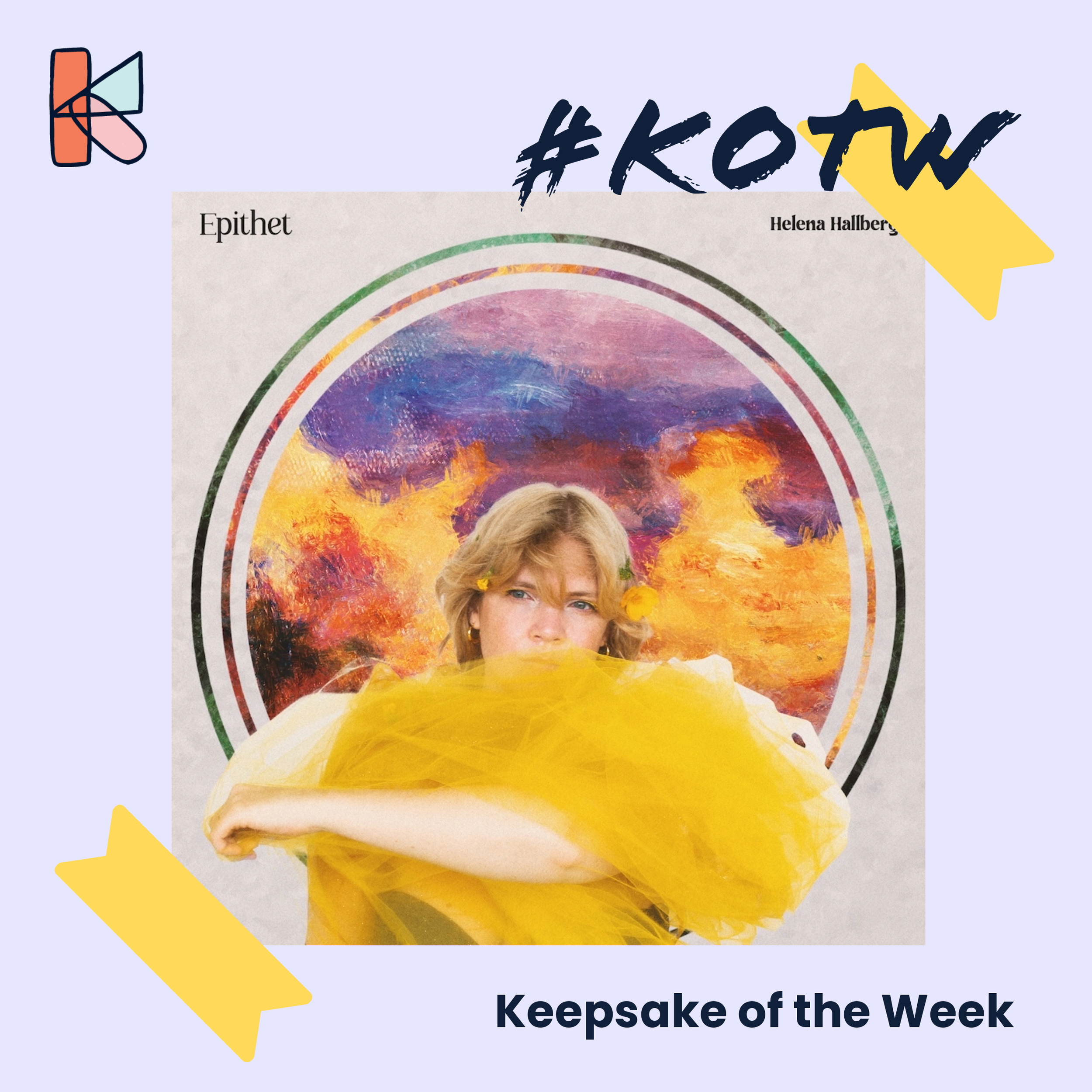Keepsake of the Week: “Epithet” by Helena Hallberg
“Epithet” is the debut LP from singer/songwriter Helena Hallberg and is this week’s #KOTW.
In this blog series, we post our favorite new or re-discovered releases in independent music, our Keepsake of the Week, or #KOTW.
Smart music—the kind with lyrics as rich as a library and production that sounds so simple it must be complicated—can easily be emotionally distant, but Helena Hallberg has a way of bringing empathy to eloquence. The Swiss-Swedish-American, polyglot, dulcimer-playing singer/songwriter takes listeners with her as she explores her womanhood in “Epithet,” her debut LP. Walk with Helena down sidewalks, through forests, across dance floors, into folktales, and inside her mind with this bodyguard of a record that rejects all stereotypes and stigma. You’ll learn plenty with Helena in your ear, but that isn’t the point. The point is that you might also find your stride.
We met Helena in 2022, when she was still based in New York, and had the honor of hearing much of this album performed live at that time. We watched her start the recording process and eventually move to Nashville to be able to work more closely with producer-collaborator, Mary Bragg. Helena said at the time that she specifically chose to work with women for this project—and her music in general—a decision that always felt important. Women still only make up 2-3% of all music producers. Upon hearing the album in its entirety now, though, the decision also feels necessary. The experiences of being catcalled, expectations surrounding motherhood, and definitions of femininity that Helena documents throughout this record are central and unique to women. But Helena is also more than “just a woman,” and far more than just one word.
Words are also central to Helena’s work. While she only sings in English here, we know from her performance in our recent show Linguistics that she also speaks and occasionally performs in Swedish, Swiss German, and High German. As if being quadri-lingual wasn’t enough, Helena is somehow able to write lyrics and rhyme schemes that seamlessly incorporate such advanced vocabulary as the words duality, procreation, aesthetics, proverbial, øresund, menarche, and of course, epithet. Literary and mythological references also abound, from Marcus Aurelius in “Heaven and Hell” to Aphrodite and Madonna in “One Word.”
The record opens with one of her best and wordiest songs, “Aesthetics of Sorrow,” but the song begins without any words at all. For the first thirty seconds, a sorrow-filled room is painted only with strings and a sudden minor chord, then some of Helena’s simplest lyrics on the whole album: “Blue and gold / And sad all over.” It only took two lines to make me cry. Perhaps Helena’s greatest strength—besides her vocabulary and voice, which we will get to—is how inviting she is. It’s only Track 1, but we’re already sitting beside her in a room inside her head, one with a melancholic aesthetic that only she could so beautifully describe. And then she sings what we all long to hear, validating our human feelings and admitting what the rest of this record will speak to: “Sorrow has its own aesthetic / But darling, you’re allowed to let it win.”
I had this disclaimer in mind as I leapt into the rest of the album, happy and sad at the same time. “Aesthetics of Sorrow” is the perfect introduction to the record’s thesis of rejecting and reclaiming stigma, whether about gender, race, mental health, or all of the above. The next two songs—”The Day I Found the Moon” and “From the Outside”—find Helena turning her perceived weaknesses into strengths, as she learns to harness that dark, yin, moon side of her femininity in the former, and decides to believe in her instincts in the latter. The moon also flows straight into talk of motherhood in “From the Outside” (Track 3, which seems to always be an important track), where Helena steps onto the forest floor of her mind and proclaims her worth, with my favorite line of the album: “Oh how I relish masculinity in heels / We don’t have time for feels / Or empathy / If you don’t go to therapy soon, you’ll just end up a projector.” Her dulcimer shines in this track that calls back to both Helena’s American folk influences like Joni Mitchell as well as her forest-filled Swedish roots, as seen in the song’s music video.
Swedish influences continue with “Surprisingly Disco,” an ABBA-infused anthem for aging with grace and confidence, and the first of the only two songs on the record that Helena co-wrote with Mary Bragg. The second is the titular track, “Epithet,” where Helena uses her wit to twist cat calls into coats of armor. The whole neighborhood joins in at the end of “Epithet,” because if they treat you like you’re putting on a show, you might as well make a party out of the spectacle.
Helena’s signature Appalachian dulcimer returns in “Lighthouse,” the song that takes us to the Swedish coast and rippling sun where Helena’s grandmother lived. Add this to the ranks of the great grandmother dedications—from Madison Cunningham’s “Life According to Rachael” and Taylor Swift’s “marjorie” to our very own Jasmine Jang’s “Crow’s Feet.” And of course, this ocean-filled track that is perhaps Helena’s best solo live performance is still my favorite song on the album.
We’re brought back to America and all its brutal history in “Heaven and Hell,” and this is the first in a string of songs that show off Helena’s vocal ability. I can attest to her presence when performing live and how the whole room silences the moment Helena starts to sing, but Mary’s productions showcase Helena’s voice just as well, and especially seem to highlight the range and diversity of this trained talent. Mary is known to record tracks in full, live takes, with every instrument in the room all together. That isn’t to say that the productions are always stripped back, because there are strings and brass and even timpani throughout the album that make the songs feel orchestral in size, as well as haunting bass lines in the moodier tracks like “Mastermind.”
The album closes with “One Word,” another favorite of mine that also begins with the dulcimer. It is hard for me to picture Helena without the dulcimer on her lap, but as I have mentioned and as this record proves, she is more than just one thing. Layers of vocals soar as she sings, “Do you think she’s one for procreation? / Or is she the other thing? / As she says ‘see me, I think I was misunderstood again / They built me a frame that I don’t fit in.’” The bridge of “One Word” is a litany of epithets, none of which can be used in summation to define Helena or any woman. She is a woman of many words, cultures, instruments, and feelings that live in both duality and contradiction, and cannot be reduced. This album is a testament to her many layers, and it paints the aesthetics of Helena Hallberg in every color.
Stream “Epithet” now and follow Helena Hallberg on via her website.
Helena Hallberg in a forest of her own creation. Taken by Anna Haas.


